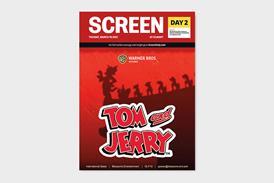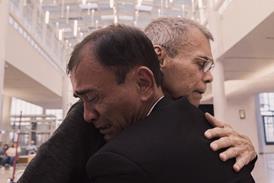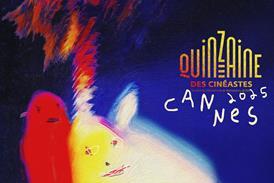Dir. Jim Meer Libiran. Philippines, 2007. 95mins
Winner of this year's Cinemalaya top award and bound for a solid festival career around the world, Jim Libiran's vibrant debut goes back to the Manila slums, which have become lately the favourite spot for cinema in the Philippines. Thispowerful but downbeat portrait of a world ruled by the vicious circle of poverty and crime, focuses on its main victims, the young generation, angrily self-destructing itself out of sheer desperation.
Moving to the hip-hop beat which pumps its way through the entire picture and establishes its pace, Libiran is less concerned with itscore plot and far more with the climate in which such a story is not only possible but very probable.
Gangs of kids in their early teens battle other gangs of similar age, while their harassed parents are impotent to do anything about it, except watch and weep.
Tribe is shot with a handheld DV camera and rudimentary lighting, which helps create a lively, spontaneous feeling of action. The intense cast seem entirely oblivious of the camera looking down their throat and go about their business as usual.
Nowell-intentioned film festival in the world will dare turn down the film.
It is told through the eyes of Ebet, a 10-year-old from the derelict Tondo neighbourhood, a warren of dilapidated lodgings separated by narrow streets inhabited almost as much as the houses themselves.
The main story is about an adolescent found dead, with a knife in his backand the attempted revenge of his pals, who organiserevenge that bythe end of the film turns into a general blood bath with no winners.
This however is not the main thrust of the film, life in the slums is.
Libiran's camera chases one character down a filth alley to his home, squirms its way in, spends some time with the family, then comes out again to follow another character that was met on the way, and so on.
The relentless rap beat on the soundtrack never lets off except when it is covered by for the shrill cacophony of people speaking, all of them, at the same time.
The picture wastes no time rubbing the viewers' nose into the Tondo slime.
Little Ebet (Karl Eigger Balingit), whose mother fornicates with a vengeanceevery night with a variety of partners,goes out in the late hours to join what he considers his real family, a gang of teenagers calling itself Thugz Angels.
He watches them use drugs and indulge freely in sex, witnesses the brutal initiation rites to which novices are submitted and follows them when the body the dead boy is found and one of the Angels is unjustlyarrested.
From Ebet, the focus of attention moves to Makoy (O.G. Sancred), the teenage son of a slaughterhouse worker, who may act the dutiful son at home, carry water from the well (for there is no running water in Tondo) and calming his parents' fear for his safety, but once outside, he reverts to his role as gang leader and sets out to settle his accounts with a rival gang, the Demons, who were most likely responsible for the murder.
Libiran and his editor, Lawrence S. Ang, tie together his restless camerawork into one seamless fluid continuity, sucking the audience into this strange and often senseless vortex where religious passion rubs elbows naturally with blatant promiscuity.
Respect for the family goes together with disrespect for human life, where sex, drugs, violence, crime and death are accepted at any age without qualm as inevitable.
The fuzzy quality of DV night shots, of which there are plenty, addsto the atmosphere. And no professional actor could match the authenticity of the performances, most of them by people Libiran found in Tondo itself.
Theaccusing finger is pointed only atthe state of things as they are in Tondo, where, to quote Ebet's voice-over narrative 'people are bums because they are poor'.
In most cases, he manages to find something affecting in almost of all the characters rushing through the picture and even to introduce here and there, moments of levity.
True, Libiran isn't the first to reveal the terrible face of the Manila slums, but that does not detract one bit from his achievement. Sadly enough, however, it most probably isn't going to change the face of the slums, either.
Production companies
8 Glasses Productions
Cinemalaya Productions
International sales
8 Glasses
Executive producers
Jim Libiran
Mitchelle Moreno
Diomedes Dillague
Gene Cajayon
Producers
Jim Libiran
Screenplay
Jim Libiran
Cinematography
Albert Banzon
Editor
Lawrence S. Ang
Production design
Armi Cacanindin
Music
Francis de Veyra
Main cast
Karl Eigger Balingit
O.G. Sancred
Shielbert Manuel
Lloyd Labastidsa


















No comments yet